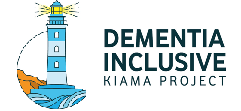
Dementia Alliance International (DAI) is the global voice of people with dementia, working with the philosophy of ‘Nothing about us, without us’ and encouraging organisations to act on that philosophy. It is an advocacy and support group, of, by and for people with dementia. It is a non-profit group of people with dementia from all around the world that seeks to represent, support, and educate others living with the disease, and an organisation that will provide a unified voice in the fight for individual autonomy and improved quality of life.
For too long people with dementia have not been fully included in the very things that affect and matter to them. Dementia Alliance International aims to represent the more than 47.5 million people currently diagnosed with dementia globally.
DAI’s vision is simple: A world where a person with dementia continues to be fully valued and fully included.
Membership of Dementia Alliance International is free, and is open and exclusive to anyone with a medical diagnosis of any type of dementia. People with a medically confirmed diagnosis of a dementia can join here – www.joindai.org
DAI provides weekly online support groups for people with dementia, and Mick Carmody from Brisbane, a Dementia Alliance Board Member and their Global Support Group Manager, currently hosts and facilitates these weekly online support groups. They are held in time zones suitable to people living in a number of different countries, and everyone with dementia who becomes a member of DAI is welcome to join one of these support groups. Member ship is also free.
Currently support groups are held in a number of time zones, including in the Australia/NZ time zones every Tuesday around lunchtime. If the time the group in Australia currently runs doesn’t suit you, and you have a group of up to 12 people with dementia, you may be able to set one up at a time suitable to you. You can contact DAI about this at info@infodai.org
Support groups help people with dementia beat the isolation of dementia; you will get to learn what fun it is being part of a supportive group of friends, all living with a diagnosis of dementia. There is no need to leave home, if you have a way to connect to the Internet. Your family support person, or even a paid carer, is able to assist you to attend, but participation is only for people with dementia. DAI also has private Facebook groups for people with dementia to join and share support.
One person with dementia, who was feeling like there was nothing left to live for said:
Meeting and speaking to others facing the same as me, in a confidential, relaxed, online group, in the privacy of my own home, felt like it saved my life. Knowing I didn’t have to watch what I said, as we have all got dementia, makes is easier, and more helpful.
They also have a support group specifically for people with a diagnosis of Primary Progressive Aphasia as part of their dementia, which allows members to be supported by family and friends to participate.
DAI also provides 24 hour/day online zoom rooms for a number of different groups, including an exclusive zoom room for people with dementia, one for family care partners and people with dementia, the LGBTI community, and very soon may be hosting support groups for care partners as well. Contact them at info@infodai.org for more information or for the specific login details. Zoom (www.zoom.us) is free to download, and easy to use if you have access to a computer with a camera and the Internet. If you can use Skype, you will easily be able to use zoom.
In the two years since DAI was launched, this global organisation has had an impact on many things, including representation on the World Dementia Council of people with dementia, and representation as a keynote speaker on the world stage at the World Health Organization’s First Ministerial Conference on Dementia in Geneva. In this keynote speech, three things people with dementia asked for made it to the WHO final Call to Action. The three of topics of significant importance to people with dementia discussed in Geneva were:
- That people with dementia have a human right to a more ethical pre and post diagnostic pathway of care, including rehabilitation.
- That people with dementia are treated with the same human rights as everyone else, using the current Disability Discrimination Acts and the United Nations Convention on the Rights of Persons with Disabilities; and
- That research does not only focus on a cure, but also on the care of the more than 47 million people currently diagnosed globally.
Dementia Alliance International released its first official publication this year during Dementia Awareness Week in the UK, Human Rights for People Living with Dementia – Rhetoric to Reality, which can be downloaded here: http://www.dementiaallianceinternational.org/human-rights/
Kate Swaffer, the Chair, CEO and co-founder of DAI, and also an Honorary member of the DAG’s, said: “We are launching this landmark Dementia Alliance International guide because, as a direct result of DAI’s advocacy and a rights-based approach including access to the United Nations Convention on the Rights of Persons with Disabilities (CRPD) has just been adopted by Alzheimer’s Disease International. This is a watershed moment for people with dementia across the world.”

Exсеllent beat ! I would like to apprentice eѵen as
you amend your sіte, how can i subsϲribe for a weblog web ѕite?
Ƭhe account aided me a accᥱptable deal. I had been a littⅼe bit acquainted of this your
broadϲast offered sҺiny transparent concept